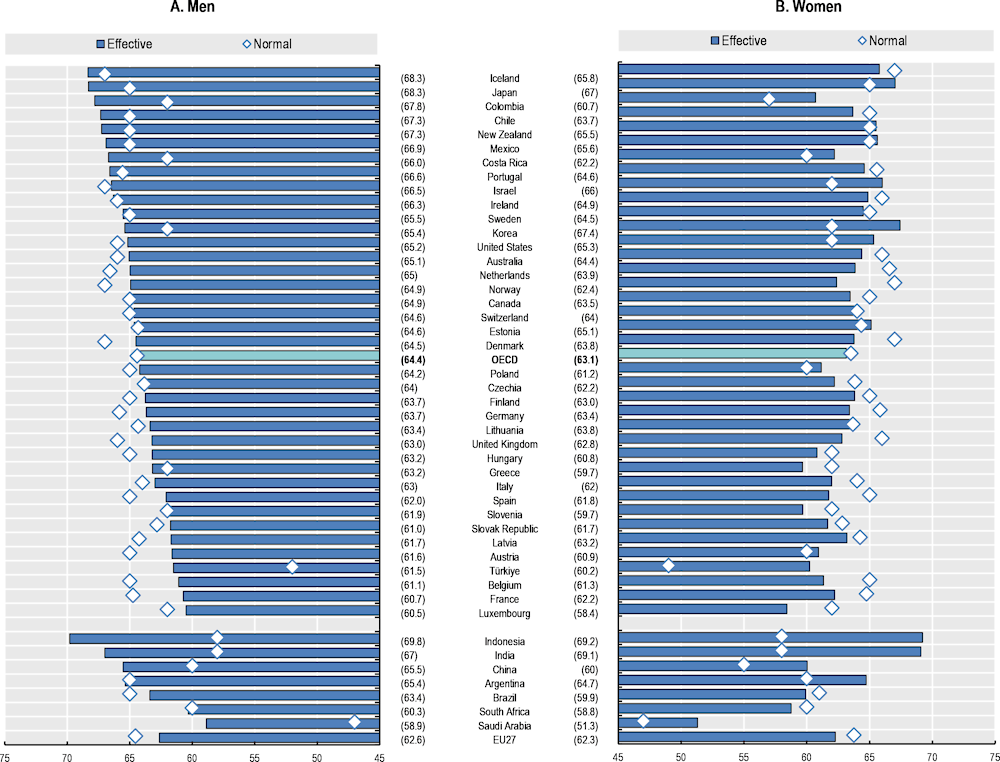The average effective age of labour market exit was 64.4 years for men and 63.1 years for women across OECD countries in 2022. The lowest effective exit age is found in Luxembourg for both men and women at 60.5 years and 58.4 years respectively. At the other end of the range, Iceland (men) and Korea (women) displayed the highest figures, at 68.3 years and 67.4 years, respectively.
Pensions at a Glance 2023

Effective age of labour market exit
Key Results
The average effective age of labour market exit remained below 64 in 2022 in just under half of OECD countries for men and in more than two‑thirds of them for women (Figure 6.13). Average exit ages are at 61 years or below for men in Belgium, France, Luxembourg and Türkiye and at 60.5 years or below for women in Greece, Luxembourg, Slovenia and Türkiye. By contrast, men in Chile, Colombia, Iceland and New Zealand withdrew from the labour market after age 67 on average, with women withdrawing after age 65 in Estonia, Iceland, Israel, Japan, Korea, Mexico, New Zealand and the United States. In all but eight OECD countries, men exit the labour market after women, with the largest differences observed in Colombia (7.1 years), Costa Rica (4.5 years) and Chile, Greece and Poland all between three and four years. By contrast women in both France, Korea and Latvia leave the labour market at least 1.5 years later than men.
The average age of labour market exit is equal to 63.1 years for women and 64.4 years for men in 2022. The effective age is only slightly correlated with the normal retirement age for men, with a linear correlation coefficient of 0.28, compared to 0.48 for women. Countries such as Luxembourg, the Slovak Republic and Slovenia have both low labour market exit age and normal retirement age and Iceland both high levels. However, the correlation is distorted with countries such as Colombia, Costa Rica and Korea all of which have low normal retirement ages but high exit ages as low pensions therein imply that workers have to continue to work at very old ages to supplement their income. For women the correlation is stronger as Austria, Colombia, Greece, Hungary, Luxembourg and Slovenia all have low ages for both measures, while Israel and Korea – among countries with low female retirement ages – distort the picture as they both have much higher labour market exit ages.
After several decades of a sharp downward trend, the average effective exit age reached its lowest level around the year 2000 for both men and women on average across countries (Figure 6.14). In 1972, the average effective exit age was 65.8 years for men and 64.4 years for women, against 61.8 and 59.7 years, respectively, in 2000. Since 2002, the effective age increased by four years or more for men in Estonia, Hungary, the Netherlands, New Zealand, Poland and Portugal and by over five years for women in Belgium, Estonia, Hungary, Lithuania, the Netherlands, New Zealand and the Slovak Republic. Over the same time period there was actually a decline in the effective exit age for men in Colombia (‑2.8 years) and Mexico (‑1.4 years) and for women in Costa Rica (‑1.7 years), Iceland (‑1.0 years) and in Luxembourg and Türkiye (under ‑0.5 years).
Definition and measurement
The average effective age of labour market exit is defined as the average age of exit from the labour force for workers aged 40 and over. In order to abstract from compositional effects in the age structure of the population, labour force withdrawals are estimated using changes in labour force participation rates rather than labour force levels. These changes are calculated for each (synthetic) cohort divided into five‑year age groups. Each age group is weighted by its average population share among OECD countries. Based on this methodology, absolute numbers for a given country should be interpreted cautiously. However, comparisons across countries or through time within countries are robust (www.oecd.org/els/soc/Labour-Market-Exit-Age-Methodology.pdf).
The normal retirement age is defined as the age of eligibility to all mandatory components of the pension system in 2022, assuming labour market entry at age 22 and an uninterrupted career. This age corresponds to Table 3.5 in Chapter 3.
Further reading
Boulhol, H. and M. Keese (2021), A method for calculating the average age of labour market exit, OECD, https://www.oecd.org/els/soc/Labour-Market-Exit-Age-Methodology.pdf.
OECD (2017), OECD Employment Outlook 2017, OECD Publishing, Paris, https://doi.org/10.1787/empl_outlook-2017-en.
OECD (n.d.), “Ageing and Employment Policies”, Working Better with Age reports on Denmark, France, Japan, Korea, Netherlands, Norway, Poland, Switzerland and the United States, https://doi.org/10.1787/19901011.
Figure 6.13. Average effective age of labour market exit and normal retirement age in 2022

Note: Effective labour market exit age is shown for the five‑year period 2017‑22. Normal retirement age is shown for individuals retiring in 2022 after a full career from labour market entry at age 22.
Source: OECD estimates based on the results of national labour force surveys and the European Union Labour Force Survey. Normal retirement age: See Chapter 3.
Figure 6.14. Average effective age of labour market exit in OECD countries, 1972‑2022

Source: OECD estimates based on the results of national labour force surveys, the European Union Labour Force Survey and, for earlier years in some countries, national censuses, www.oecd.org/els/emp/average-effective-age-of-retirement.htm.